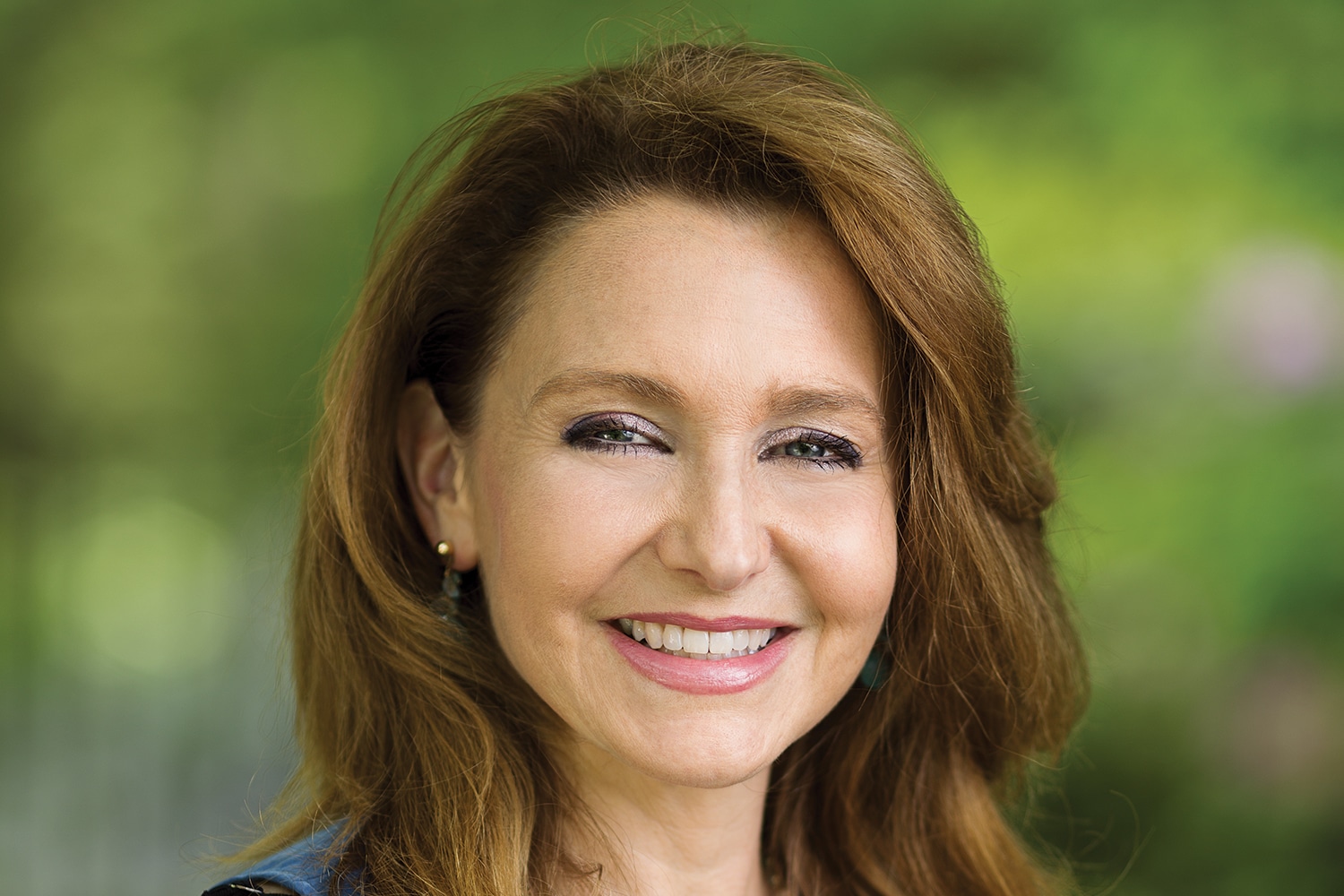IN 2010, FELICIA MARIE KNAUL was asked to give a talk on early detection of breast cancer at the Hospital de la Mujer of Yautepec, just south of Mexico City. About 200 patients and health care workers filled the hospital’s auditorium to hear her speak. When the talk was over, Knaul recalls, a woman from the audience stood up and said in Spanish, “Why would I want to know if I had breast cancer? A woman without breasts is ugly.” Knaul, a breast cancer survivor who had a mastectomy in 2007, looked at the woman and asked calmly, “Do you think I am ugly?”
This video highlights health economist and breast cancer survivor Felicia Knaul, who talks about her efforts to increase breast cancer screening in Mexico and address cancer inequities around the world.
Knaul, now 48, is a petite and soft-spoken woman. But her warm and gentle demeanor masks a fiery determination. The health economist has spent nearly 25 years working to reduce health care inequalities in Latin America, and she often uses the story of the woman in the audience to illustrate the cultural barriers that prevent many Mexican women from undergoing regular clinical breast exams. “I believe there’s this sort of self-stigmatization. And fear of abandonment [by their male partners] is very common,” she says. What’s more, the majority of breast cancers in Mexico, especially among poor women, are detected late because of a lack of information and inadequate training of health care providers. Breast cancer is now the leading cause of cancer death among Mexican women, and the second most common cause of death overall among Mexican women between 30 and 54.
It was Knaul’s own breast cancer diagnosis at the age of 41 that marked a turning point in her career, focusing her attention on the huge disparities in access to cancer screening and treatment in Mexico. That realization spurred her to start Tómatelo a Pecho, a Mexican nonprofit aimed at improving early detection of breast cancer and combating the stigma associated with the disease. With that experience, she has helped launch a global movement to improve cancer care in other developing countries.
Culturally Sensitive
Knaul was born and raised in Toronto. Her father was a Holocaust survivor who died from stomach cancer when she was 18. In her book Beauty Without the Breast, a personal account of her experience with breast cancer (first published in 2009 in Spanish and in 2012 in English), she describes “the mute cry of the Holocaust that was tattooed on my father’s forearm.” Haunted by the fear and trauma he experienced in the concentration camps, her father transmitted that fear to the rest of the family.
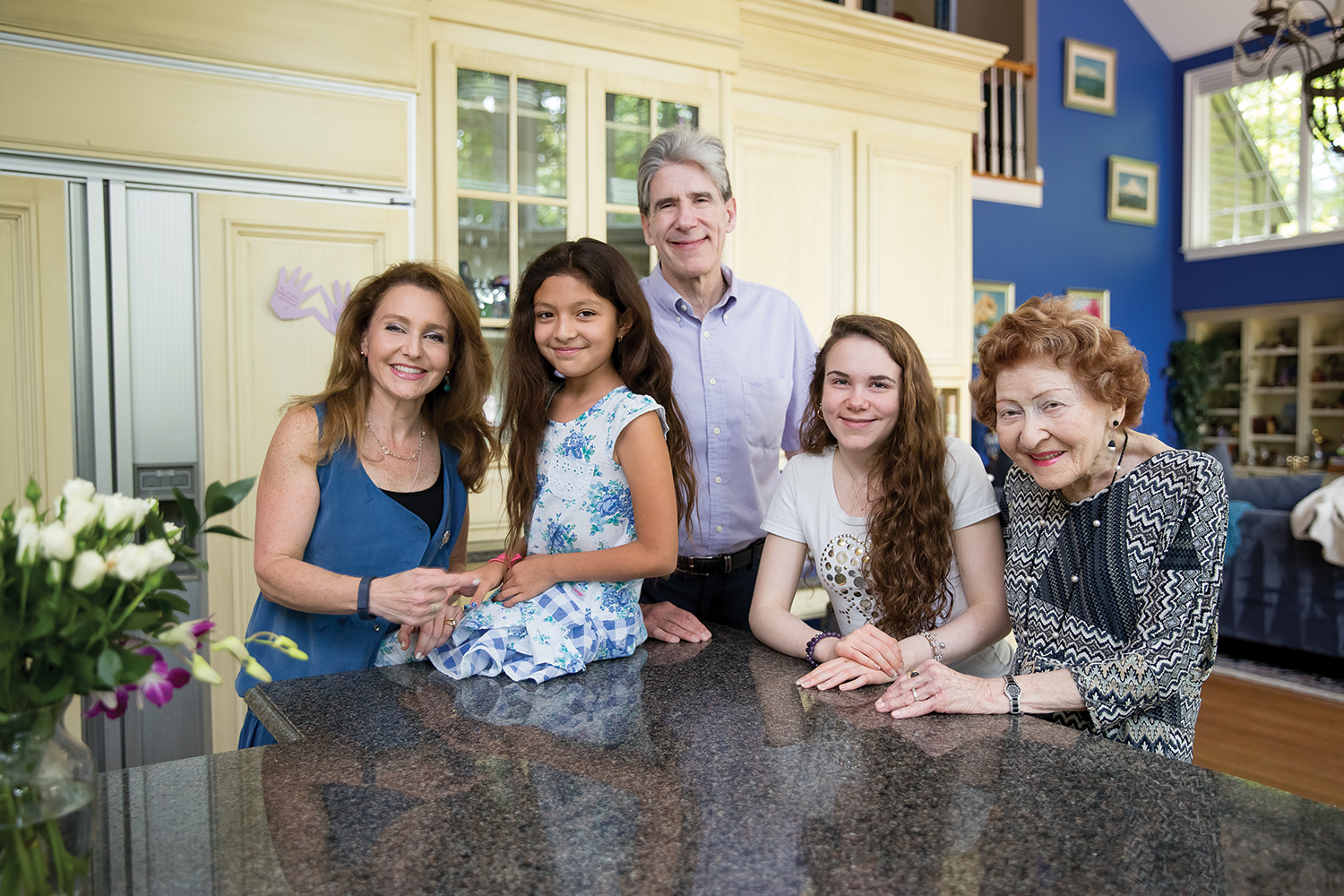
Felicia Knaul and Julio Frenk stand with their daughters, from left, Mariana, 10, and Hannah, 18, and Felicia’s mother, Marie Knaul. Photo by Bryce Vickmark
“There are two ways to manage the pain of being the child of a Holocaust survivor,” says Knaul. “One is to say, ‘we must protect ourselves because it could happen again.’ The other is to say, ‘we have to make sure it doesn’t happen ever again.’ I chose the second path.” While pursuing her doctorate in economics at Harvard in the early 1990s, she did her thesis work on street children and child labor in Latin America and spent several years living in Bogotá, Colombia. “I had this very strong feeling that I wanted to do something for severe forms of injustice,” she says.
In 1993, while working on her doctoral thesis, she was hired by the Colombian government to focus on the country’s health system reform. Around that time, she met her husband, Julio Frenk, a physician from Mexico who had been brought in as an adviser for the reform. The two married in 1995 and settled in Mexico.
In 2000, her husband was named Mexico’s minister of health. Over the next six years, he oversaw the country’s health system reform called Seguro Popular—an effort to expand health coverage to more than 50 million Mexicans who lacked health insurance. During that time, Knaul was a senior economist at the Mexican Health Foundation, a nonprofit focused on health care policy and research, and became deeply involved in many health care initiatives, including the establishment of the first hospital-based schools in Mexico for children with long-term illnesses. She also worked closely with her husband on efforts to expand health coverage.
More resources means better care in high-income countries.
- In 2012, low- and middle-income countries accounted for about 57 percent of the 14.1 million new cancer cases and about 65 percent of the 8.2 million cancer deaths worldwide.
- By 2030, these countries will bear the burden of an estimated 27 million new cancer cases and 17 million cancer deaths.
- More than half of women who develop breast cancer in low- and middle-income countries die from the disease, compared with less than a quarter of breast cancer patients in the developed world.
- Approximately 90 percent of cervical cancer cases occur in low- and middle-income countries.
- Tobacco use accounts for 30 percent of all cancer deaths in the world. Approximately 80 percent of current smokers live in low- and middle-
- income countries.
- Seventy percent of the world’s cancer radiation therapy facilities are in high-income countries. Thirty countries, 15 of them in Africa, do not have a single radiation therapy machine.
Source: International Agency for Research on Cancer (IARC), Closing the Cancer Divide
The Privilege of Access
In October 2007, when she had her first mammogram, doctors found a tumor in Knaul’s left breast. She was diagnosed with stage II breast cancer. After two unsuccessful surgeries to remove all the cancer, Knaul eventually underwent a full mastectomy of her left breast followed by 15 months of drug therapy, including chemotherapy and Herceptin, a targeted drug used to treat HER2-positive breast tumors. She then took tamoxifen, a drug used to treat hormone-sensitive tumors, for five years to help prevent the disease from returning. Almost all of her surgeries and treatments were performed in Mexico.
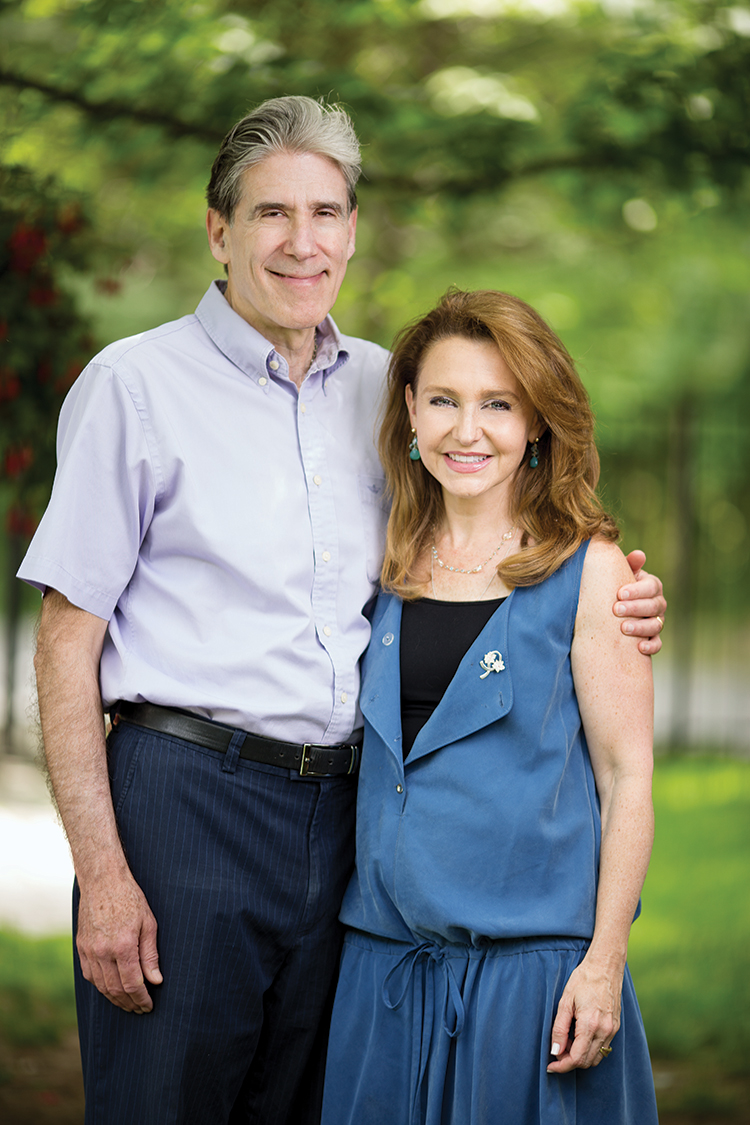
When Felicia Knaul was undergoing treatment for breast cancer, she frequently gave talks in Mexico accompanied by her husband, Julio Frenk, at left. Photo by Bryce Vickmark
Knaul remembers feeling overwhelmed and terrified at the time of her diagnosis. Her youngest daughter, Mariana, was only 3 at the time; her eldest, Hannah, was 11. Shortly after her first surgery, she went for a long walk near her home in Cuernavaca, south of Mexico City. “I was feeling very sorry for myself,” Knaul recalls. “And then for some reason, as I was walking, I thought about what it would be like to have the same diagnosis and be poor or not have a stable family.” Knaul knew she was fortunate. She had unlimited access to the best doctors and hospitals in Mexico. But for the vast majority of Mexicans, this was not the case. As Knaul walked on, the idea for Tómatelo a Pecho formed in her mind.
Five months after her diagnosis and while still undergoing chemotherapy, Knaul launched Tómatelo a Pecho. The name refers to a colloquial expression, which literally means “take it to breast,” a riff on the phrase “take it to heart” or “take it seriously.” Through the program, she and her colleagues have trained thousands of Mexican health care workers to perform clinical breast examinations, identify patients at risk based on family history, and teach women to look for important changes in their breasts.
The group is also active in combating discrimination and the stigma associated with breast cancer, since many Mexican women with the disease still fear spousal abandonment even today. Knaul’s husband has been particularly vocal on the issue and has publicly described machismo as a “social cancer” that prevents women from seeking health care. While Knaul was undergoing treatment, she frequently gave talks with her husband at her side. “By that point I was bald, swollen and mastectomized, and he would stand up and say, ‘A woman is more than her breasts, and I didn’t leave her,’ ” she recalls. “That message of nonabandonment, of thinking of your own body image in a different way, has been crucially important.”
A Global Movement
With her nonprofit well underway, her cancer treatment over, and her book Beauty Without the Breast set to be released in Spanish, Knaul’s career took another turn. In January 2009, her husband was appointed dean of the Harvard School of Public Health. That summer, the family relocated to the Boston area, where Knaul accepted the position of director of the Harvard Global Equity Initiative (HGEI), a research program focused on reducing global inequities.
Within months of arriving at Harvard, in November 2009, Knaul organized the university’s first conference on breast cancer in low- and middle-income countries. The event brought together academics, health care practitioners, policymakers and advocates from around the world. “Felicia is a visionary and is incredible at bringing people with different perspectives together,” says health systems researcher Afsan Bhadelia, who was the director of HGEI’s Women, Health and Equity program at the time. Representatives from Africa, Asia, the Middle East and Latin America came to share the many challenges facing their countries, including limited access to drugs and screening equipment, a shortage of oncologists, and inadequate training in early detection for health care professionals.
But the challenges facing these nations extend far beyond breast cancer, says Knaul. Cancer overall is now a leading cause of death in low- and middle-income countries. Today, more than half of all new cancer cases worldwide and two-thirds of cancer deaths occur in less developed regions. To raise awareness of the issue and engage the global community, Knaul and her colleagues launched the Global Task Force on Expanded Access to Cancer Care and Control in Developing Countries. In 2010, the task force, under Knaul’s leadership, published a call to action in the Lancet journal—urging leaders around the world to address global disparities in cancer care. Two years later, the group published a book called Closing the Cancer Divide, which lays out overwhelming evidence of the widening gap in cancer care between high- and low-income countries.
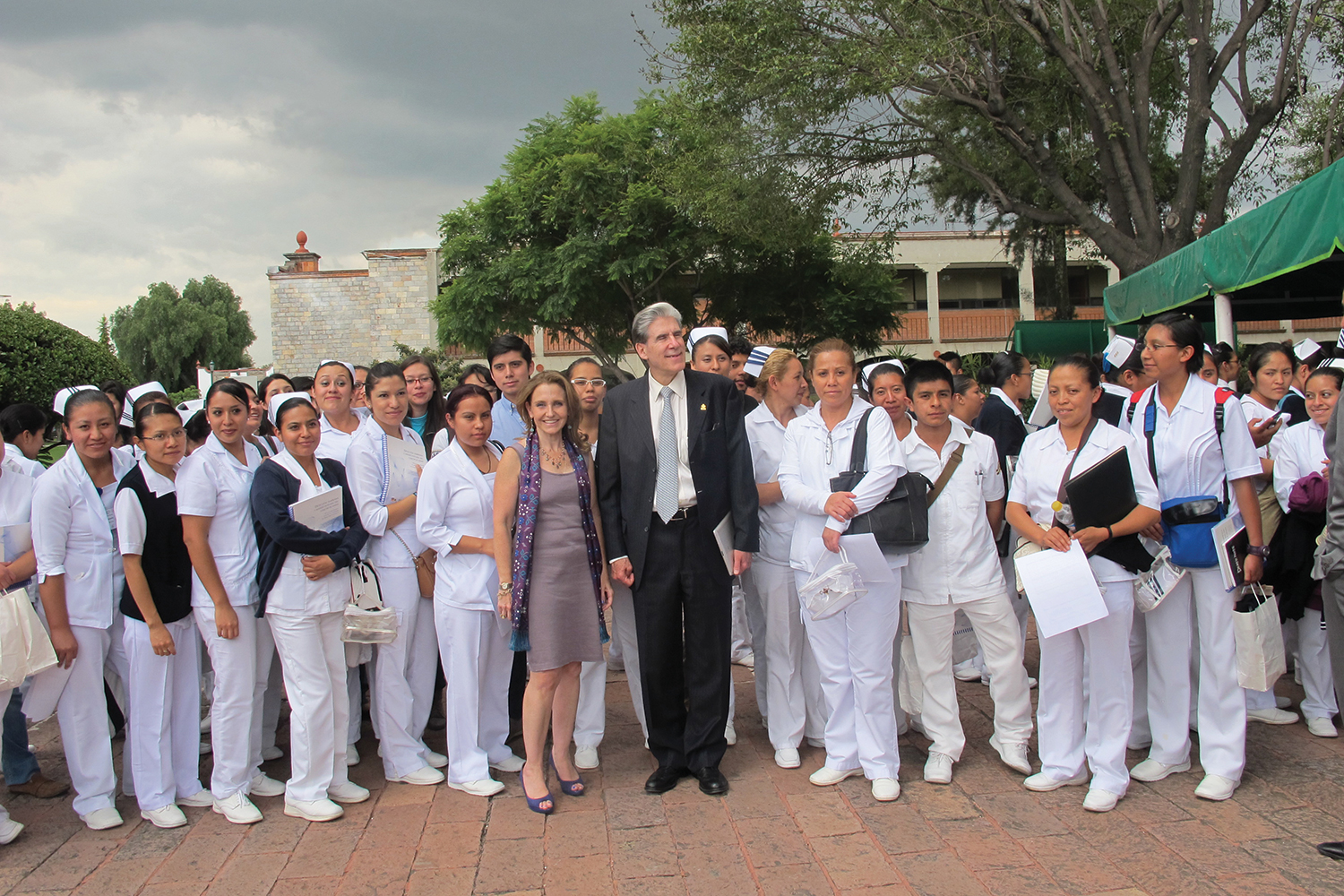
Felicia Knaul and her husband, Julio Frenk, stand with nurses, primary care doctors and medical students after a training session at the Universidad de las Americas Puebla in Cholula, Mexico. Photo by Sonia Xochitl Ortega Alanis
Frenk credits his wife with bringing the issue of the increasing burden of cancer on developing countries to the forefront through her work with the task force. “I think Felicia has really opened our understanding of this new frontier in health inequities,” he says. He likens the situation to the early days of the HIV/AIDS epidemic, when health care leaders thought it would be too costly to treat patients in developing countries. Eventually, a global advocacy movement emerged and successfully transformed policy and the market for HIV/AIDS drugs, allowing millions of people in poorer countries to have access to lifesaving therapies. He and Knaul hope a similar global movement will make cancer screening and treatments more accessible to millions of cancer patients in the developing world.
Easing the Pain
Sitting in her home in Sudbury, Massachusetts, outside of Boston, Knaul reflects on her work. The walls are adorned with Latin American art, reminiscent of a country and culture she’s wholeheartedly embraced. Having spent most of the last five years in the U.S., she is proud of what she has accomplished through her position at Harvard. “But my heart is in Mexico,” she says. She continues her work with Tómatelo a Pecho and the Mexican Health Foundation. And the family maintains their house in Cuernavaca, where they spend their summers.
More recently, Knaul has turned her focus to another inequity: the divide in access to pain control and palliative care. “We have undervalued this issue tremendously,” she says. High-income countries account for 94 percent of the global consumption of morphine, yet constitute only 15 percent of the world’s population. The vast majority of terminally ill cancer patients in middle- and low-income countries do not have access to opioids like morphine, even though the drugs are relatively inexpensive. “Millions of people around the world are dying from cancer in pain,” says Knaul, referring to the lack of access to drugs to manage pain in lower-income countries. “I feel sickened. It makes no sense to me.”
More than five years after completing treatment, Knaul says cancer changed her in ways she did not anticipate. Attempts by her doctors to reconstruct her breast after mastectomy were largely unsuccessful, and the long-term effects of chemotherapy and Herceptin have taken a toll on her. She experienced early menopause from the chemotherapy and says her body has aged 20 years. “It’s a bit of a shock to wake up and feel like you’ve lost that time,” says Knaul.
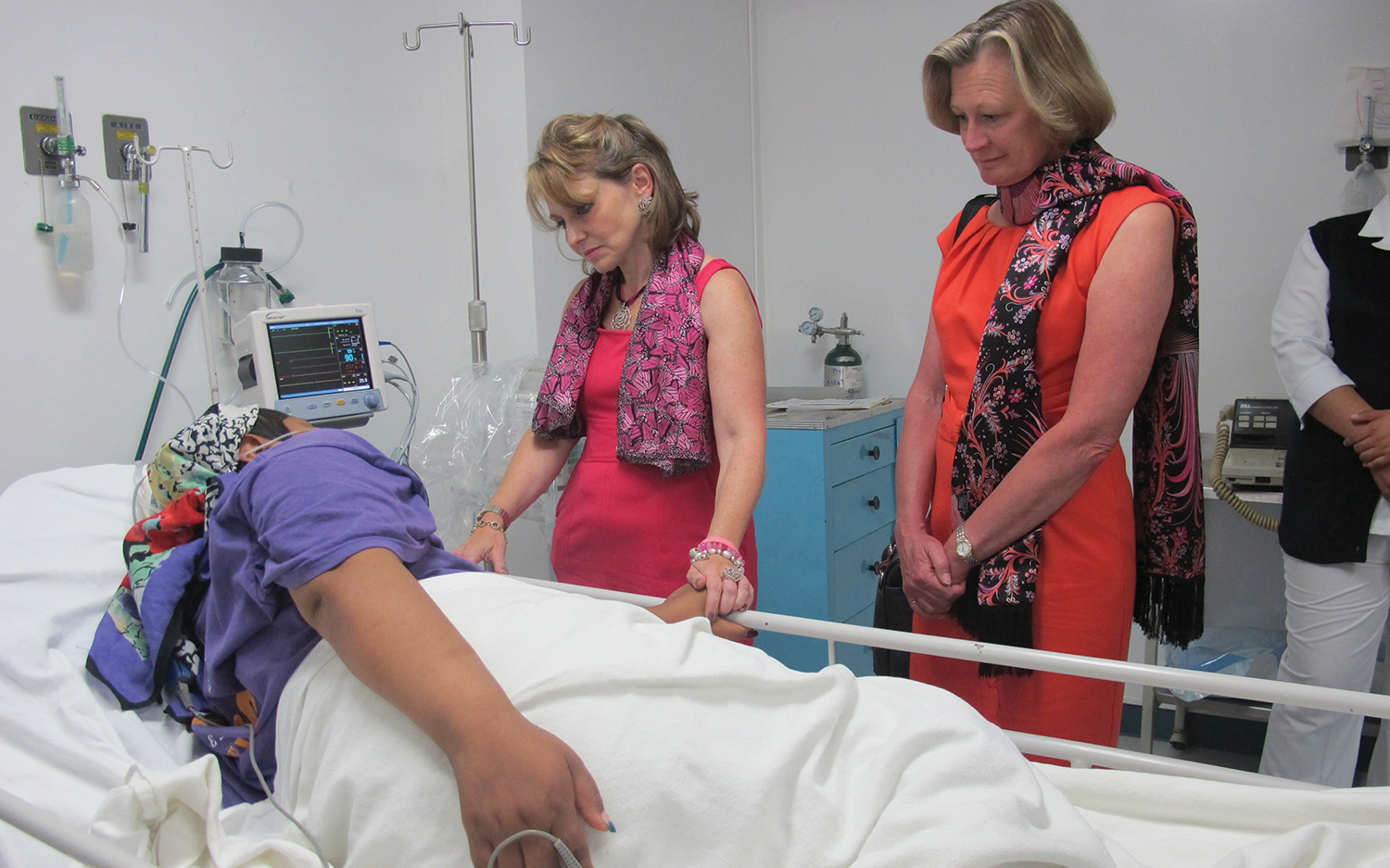
Felicia Knaul visits a patient at the Hospital Regional de Ciudad Guzmán in Mexico. Photo by Sonia Xochitl Ortega Alanis
When talking about survivorship, Knaul prefers to use the term “thrivership,” as she tries to focus more on appreciating the little things in life and on acts of giving. “In a sense, that’s what my father taught me,” she says, recalling his stories of those who made it through the concentration camps. “I remember him telling me that if you didn’t share your bread, then you were on your last legs. So long as you had that sense that you could still give, you could still be decent to others, if you still had humanity left in you, then you had a fighting chance.”
Her work—through Tómatelo a Pecho and HGEI—has helped her through trying times. “The fact that I might be able to use [my illness] to do something good for other people, that inspires me and makes me feel better and more healthy,” says Knaul. Her desire to transform a negative experience into something positive echoes another lesson she learned from her father. In the last chapter of Beauty Without the Breast, she writes, “I remember and bear witness to the Holocaust, as my father taught and asked of me, by working to reduce global suffering and converting a dark past into inspiration to produce a brighter future, a future that is more just.”
Cancer Today magazine is free to cancer patients, survivors and caregivers who live in the U.S. Subscribe here to receive four issues per year.

